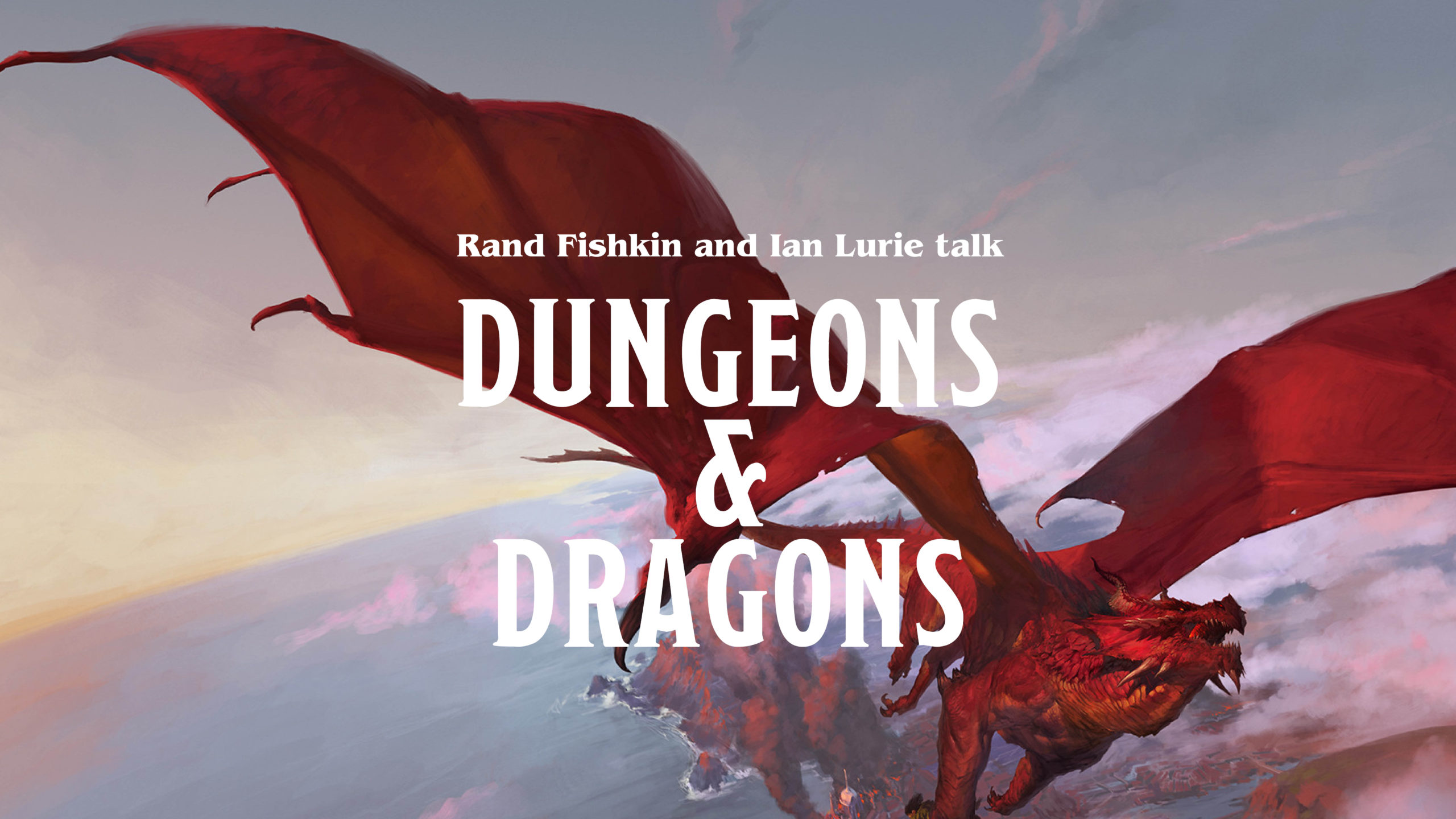The Pure SEO Team
The editorial team at Pure SEO is super proud of our content. Follow our official channels on social media.

SEO experts Ian Lurie and Rand Fishkin recently stopped by the Wizards of the Coast Seattle office to talk about D&D, and how the game has influenced their digital marketing careers.
No matter who you are, or when you were born, you’ve probably heard about Dungeons & Dragons. The popular fantasy tabletop role-playing game (for the uninitiated, think somewhere between a board game with dice and an improv radio play) has been around for nearly fifty years now.
Beginning in 1971, the game has led a storied life, thrust into the American cultural mainstream during the ‘satanic panic’ of the late 60s and 70s, and now experiencing a renaissance decades later. This resurgence in popularity is thanks in part to a swell of nostalgia for the 70s, 80s and 90s over the past few years – see Netflix’s popular series Stranger Things as an example – but can also be attributed to the launch of the games fifth edition back in the early 2010s.
D&D 5e – as it is referred to by fans – is the version most players use now, and its player base includes a constantly growing number of celebrities, some of whom have been playing from the very start. These fans include names like Stephen Colbert, Deborah Ann Woll, Joe Manganiello, Vin Diesel, Judi Dench, Joseph Gordon-Levitt, Steven Spielberg, and, yes – Ian Lurie and Rand Fishkin.
During the interview with WotC’s Greg Tito and Shelly Mazzanoble – which you can watch here – Rand talked first about how Ian introduced him to the game many years after he first became interested in it as a kid.

At 12 years old, Rand was drawn to the game, which he bought and took to school, only to get bullied for it. With no one else to play the game with, Rand’s mother played with him for a while – she would go on to become business partners with him and help him found SEO industry juggernaut Moz. The bullying pushed him away from the game for many years, though he admits harbouring a secret interest in it the entire time.
“You both run marketing companies here in Seattle, right?” Greg asks, and Ian pipes up. “I run a digital agency,” he says, playing down how influential Portent has been in the marketing space. He goes on to refer to Rand as an SEO rockstar, to which Rand shakes his head – the pair are both enormous fans of each other’s work, but humble to a fault. Rand left his company, Moz, about a year ago, “to play Dungeons & Dragons full time,” he jokes.
“I almost killed him.”
– Ian on his first game he played as Dungeon Master with Rand.
Nowadays, the pair both speak at a lot of marketing events. Despite living and working in the same city, it wasn’t until Ian gave a talk at an event in Stockholm that the pair officially met.
At the event, Ian Lurie gave a talk on “how everything I learned about marketing, I learned from D&D.” The talk isn’t available anywhere online, but Rand says he was sitting at the back, horrified that he understood all of the references and inside jokes even though he’d never really played the game, and worried that others in the audience would notice and judge him.
Ian’s talk gave rise to this exchange:
Rand even ended up writing about the experience himself, in a blog post called Pushing Back Against Shame and Failure (plus a story about D&D). It’s well worth a read even just from a business perspective. Here’s a quote from Rand after getting involved in the world of D&D, and finding creators like Matt Colville of MCDM:
“I think I cried when I heard Matt say “this is not a failing on your part.” I no longer heard him talking about D&D. I heard him talking about Moz. I heard him forgiving me for all the mistakes I made, and all the people I feel I’ve let down. Somehow, suddenly, a guy giving advice on how to play a super-nerdy tabletop game on a YouTube channel brought my entire professional life into relief.”
– Rand Fishkin
“I almost killed him,” Ian says of the first game he played with Rand. He admits that the experience was nerve-racking; as the Dungeon Master for the game – a kind of referee – Ian felt like he was on the spot to make sure it was a good experience for Fishkin.
Ian also has much more experience with the game, as it’s how he’s spent a lot of his social time with his friends over the years. “I have one friend I’ve played with on and off since I moved to Seattle in 1993,” he says.
The pair go on to comment that in many ways it’s a perfect way to keep strong bonds with peers in adulthood. Rand points out that – broadly speaking – men in their 30s, 40s and 50s tend to start losing their friends. He posits that it’s a problem with American culture in general to an extent, but seems pronounced in men, and mentions an article he read on how men struggle to hang out with each other without having some sort of activity to do. “D&D is kind of amazing for that,” he says. “Even though it’s ridiculous improv storytelling in fantasy land, it builds real bonds.”
Rand is quick to also point out that it’s “obviously not just men” playing D&D, especially now. Around 40% of players are women, according to the hosts, and Ian and Rand confirm that about 40% of the members of groups they play with are women. Greg Tito mentions that the launch of 5th Edition in 2014 was always intended to make a statement that “this game is for everyone.”
The decision to push for a much more inclusive 5th edition of the game is partially in response to the male-dominated history of Dungeons & Dragons.
Even though it’s clear to any hardcore fans that there have always been non-male people both playing and designing tabletop role-playing games, including D&D, a lot of the non-male history of the game is forgotten or erased.
Sometimes, Ian and Rand run D&D games for potential investors, as a way to get to know them. “Don’t kill them,” Shelly quips.
Today, the game still struggles with a legacy of male gatekeeping by those who mistakenly think the hobby is by men, for men. Rand and Ian touch on this in the interview, and they relate it back to the bullying they both faced in school.
They talk with the hosts about how the insular nature of the game grew out of a culture of boys who felt rejected and ostracised, who have now become the exact thing that they hated by making others feel rejected and ostracised. For a time, D&D was assumed by many to be hard to play because of this.
But then came along video games, and Fishkin postulates that they helped push D&D further into the mainstream, into a place where gatekeepers couldn’t thrive anymore.
Sometimes, Ian and Rand run D&D games for potential investors, as a way to get to know them. “Don’t kill them,” Shelly quips, before Rand points out that breaking into being an investor is hard, for the same reason that D&D still feels so unapproachable for so many.
“You said 40% of players are women… …I don’t think [even] 4% of venture investors are women. I don’t think [even] 4% of capital has gone to women,” Rand says, on the virulent gatekeeping he sees in the business world.
“It’s a tremendously exclusive old boy’s club… if you look like Ian and I, you’re probably okay. If you don’t, everything is a million times harder.”
“It would be beautiful,” he says, on the idea that D&D could play some small role in helping break down those walls.
“Is there anything they could do in the game that would turn you off working with them?” Shelly says, asking if you can tell a lot about someone by the way they play the game. “Yeah, I think you can tell a lot,” Fishkin says, going on to list skills you need to play the game well – teamwork, empathy, etc.
“And seriously,” Lurie chimes in with an example of a red flag, “if they play against the other players. I think that would be my first instinct.”
You can probably expect to keep hearing about D&D as it continues to gain steam – many in the games industry are calling it a new ‘golden age of tabletop games’.
You can even find D&D here at Pure SEO! We run a monthly game, both for team-building and as a way to unwind at the end of the work-week.
With the advent of online streaming platforms like Twitch, there are also a number of online shows where you can watch others play the game live. It’s never been easier to get into it than right now, and – chances are – you already know someone who’s playing.


